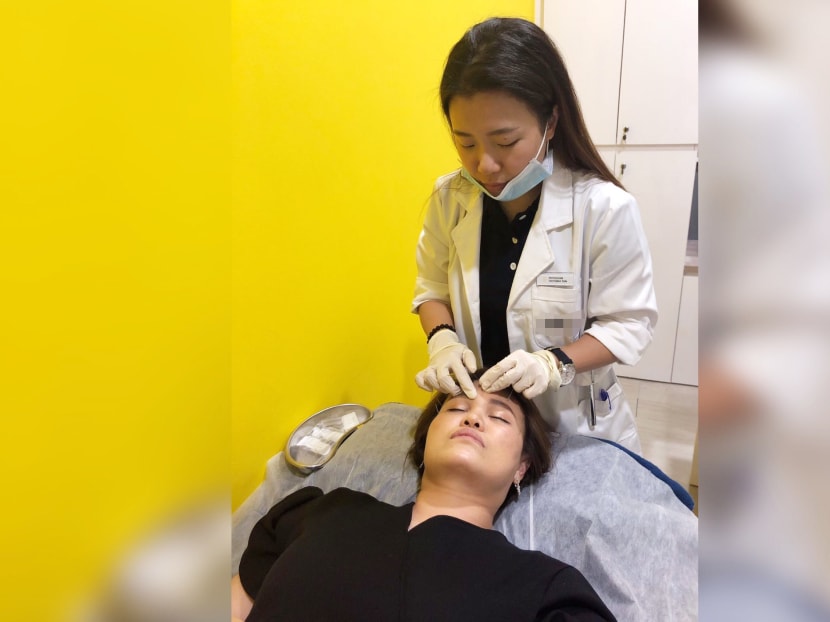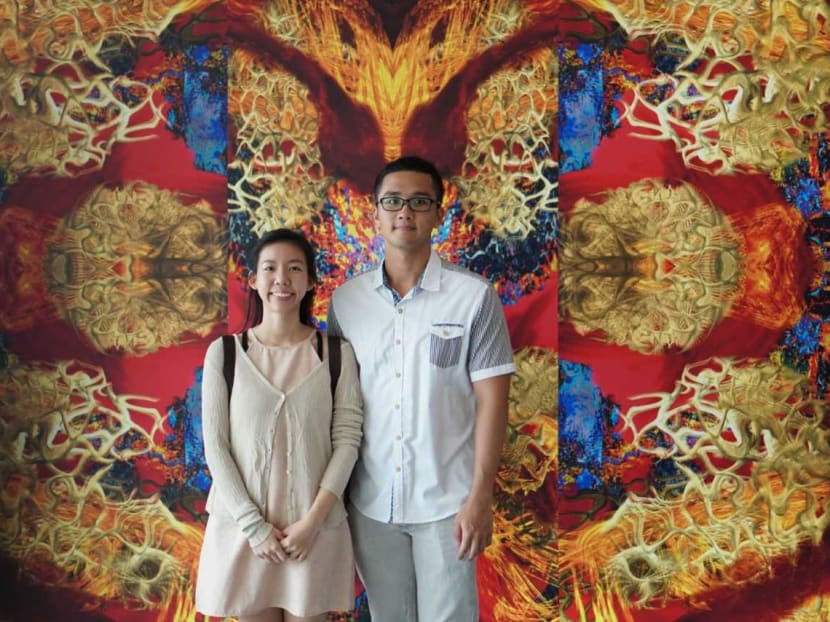Bilingual and tech savvy, young practitioners breathe new life into TCM with modern practices
SINGAPORE — When Victoria Tan was growing up, her mother would frequently boil herbal soups — chicken with goji berries, red dates and ginseng — to help boost her low immunity.

Ms Victoria Tan, 27, is part of a new generation of traditional Chinese medicine practitioners adding modern dynamism to the ancient practice.
SINGAPORE — When Victoria Tan was growing up, her mother would frequently boil herbal soups — chicken with goji berries, red dates and ginseng — to help boost her low immunity.
The 27-year-old said that she would often fall sick, and drinking the soups her mother brewed helped her to keep up with her daily commitments.
“Those who knew me would know that I juggled a lot of things at the same time. My mum would boil all these herbal soups to strengthen my body to ensure that I am well enough to do all the things I want to do,” she said.
She added that “now, I do feel that my immune system is quite strong as I don’t fall sick as regularly as my other friends”.
Her exposure to the health benefits of traditional Chinese herbs sparked her interest in traditional Chinese medicine (TCM) and led her to enroll in Nanyang Technological University’s (NTU) bilingual double degree programme in biomedical sciences and Chinese medicine.
She is one of a growing group of young physicians who hope to breathe new life into the TCM trade — and demand is strong to enter a career once seen as fading in relevance.
According to NTU, about 150 students apply to join the double degree programme each year but the course takes in only about 30 annually.
Some undergraduates in the programme, as well as recent graduates, told TODAY that even though TCM has its naysayers, they believe in time the public will see that TCM can play an important role in supporting Singapore’s healthcare system, especially as the field turns towards more research and evidence-based science to bolster its treatments.
Efforts are underway to further professionalise the practice of TCM. On July 30, NTU announced that they have collaborated with Kwong Wai Shiu Hospital (KWSH) to launch an internship and exchange programme for the students in the double degree programme.
In a joint statement by NTU and KWSH, plans were also announced for a new residency programme for the fresh NTU graduates. Under the programme, new trainees will be mentored by the hospital’s senior TCM physicians for two to three years to better hone their skills in a clinical setting.
The move is part of the Government’s efforts to promote and expand the TCM industry in Singapore. In 2017, then Senior Minister of State for Health Chee Hong Tat announced that an additional S$10 million would be invested to support the development of the TCM sector.
The funding would be invested in the training and development of registered TCM professionals and helping TCM clinics in adopting new technology. Of the total, S$5 million is being set aside for the TCM research grant which was set up in 2014. The Ministry of Health (MOH) has also expanded the grant to cover research into traditional Chinese exercises such as taiji, and therapies such as tui na massage and the use of TCM herbs in preventing diseases and improving patient outcomes.
MODERNISE TCM TO HELP BUST MYTHS
However, while government funding has expanded to support the TCM industry, the public perception of the practice is seen by those in the field as a little dated.
Many Singaporeans still view TCM as a dying trade that is being kept alive only by its older clientele. According to Ms Tan, many perceive TCM to be “slow acting”, requiring months before it has any effect. She added that TCM needs time to prove itself to the public that it is “actually scientific and (its) efficacy is quite fast”.
The NTU double degree programme in biomedical sciences and Chinese medicine, which was introduced in 2005, is designed to change that.
In an email statement to TODAY, director of the NTU Chinese Medicine Clinic Dr Goh Chye Tee said that the bilingual programme seeks to use an “innovative East meets West” approach in modernising TCM studies.
He explained that students enrolled in the programme spend the first three years at the NTU School of Biological Sciences, where they are exposed to courses on anatomy, biochemistry and biomedical pharmacology, before they proceed with their Chinese medicine clinical training and learning advanced Chinese medicine principles at the Beijing University.
This fusion of the two disciplines is what attracts many of the students to apply to join the programme.

Undergraduate students from NTU Chinese Medicine Ms Sim Shi Yun (left) and Mr Yap Chong Sin. Photo: Tessa Oh
One of these students is Ms Sim Shi Yun, 21, a third year undergraduate at NTU. Ms Sim, who was first exposed to TCM by her parents who volunteered regularly at TCM halls when she was younger, said that the meeting of Western and Chinese medicine will “open up many more possibilities in the advancement of the medical field in the future”.
She added that she believed the integration of both disciplines in her studies will help to widen her career options as, unlike a conventional medical degree, it does not confine her to only becoming a practising physician.
Similarly, fellow third-year undergraduate Mr Yap Chong Sin, 23, also said that the “East meets West” approach has bolstered his understanding of both Western and Eastern medical practices.
“I feel that if you just understand the TCM side and don’t understand the Western side, when patients come to you with a scan or report, you won’t be able to help the patient at all. Having both will help us to increase our knowledge,” he said.
PUBLIC KNOWLEDGE ON TCM IS LACKING
Ms Tan, a practising physician at Pulse TCM Clinic, said that while she has started to see more young people coming to TCM clinics in the last three years, more outreach can be done to increase the public’s awareness of its value and efficacy.
This sentiment is shared by many of the alumni from the programme who have chosen to practise TCM after graduating.
Ms Soh Shan Bin, 33, who practises TCM at Renhai Clinic and teaches TCM courses both at the clinic and the Confucius Institute, said that in her experience, many people are actually interested in Chinese medicine but are hesitant to try it because they do not know how it works.
“Because our medical system is more (biased) towards Western medicine, both the Western doctors and the patients don’t quite know about Chinese medicine and are not very receptive to (it), but that is because they don’t understand and it does not help that Chinese medicine is usually explained in Chinese,” she said.
That is why young physicians such as herself have chosen to use their bilingual education to disseminate information about TCM to English speaking Singaporeans. Many of her peers, who have started their own clinics, have chosen English speakers as their main demographic, marketing their services on social media and online.
Ms Soh notes that when she takes the time to explain the treatments in English to these patients, they are “more receptive” to following the instructions given. “When patients cannot talk properly with the physician, it is a bit hard to diagnose and give the corresponding treatment and so the effect (of the medicine) is not as good,” she added.
MORE YOUNG PEOPLE SEEK TCM FOR SPECIALISED TREATMENT
The young physicians who spoke to TODAY indicated that many of the young people who they see in the TCM clinics usually come for more specialised help.
Many patients come for skin concerns, the most popular being eczema, because they do not find Western medicine to have a lasting effect in alleviating their condition.
Ms Soh also said that she has seen many women who experience infertility issues seek help from TCM clinics, and while some will complement TCM treatment with Western medical options such as in-vitro fertilisation, others reported that they are able to conceive naturally after consulting Chinese medicine.
Ms Lim Yan Ting, 27, the manager of Nanyang Zhongjing TCM Institution, said that she has also seen more young parents bring in their children for paediatric massages. “Children are less willing to take medicine and some parents also do not want their children to be taking so much medication and so TCM is a good option for them.”
Many of these couples also come to the clinics through recommendations from their own parents, who are frequent patrons of TCM halls. Ms Lim added that once the couples have experienced the treatment for themselves, they are usually more willing to continue with the visits.
“Once we interact with the patients and are able to explain their issues and problems, actually a lot of them do come back for treatment. Some of them come in with a ‘let’s just try it’ attitude, but after the first few treatments, they are more convinced,” she said.











